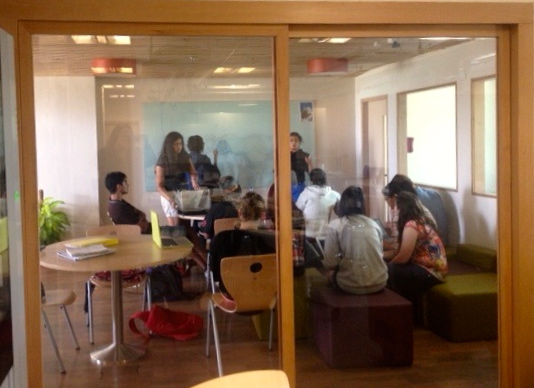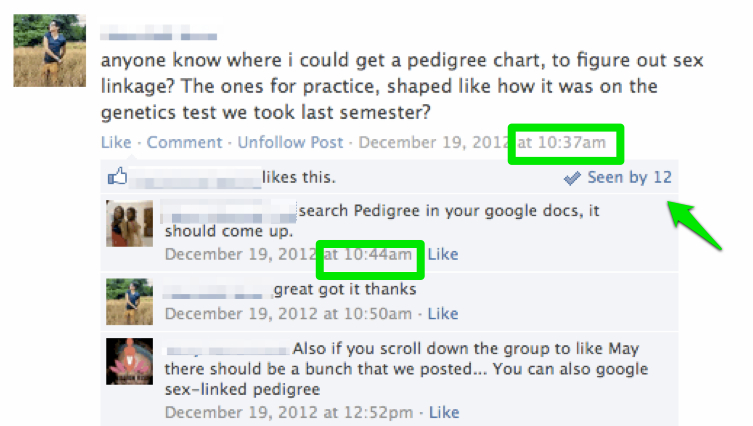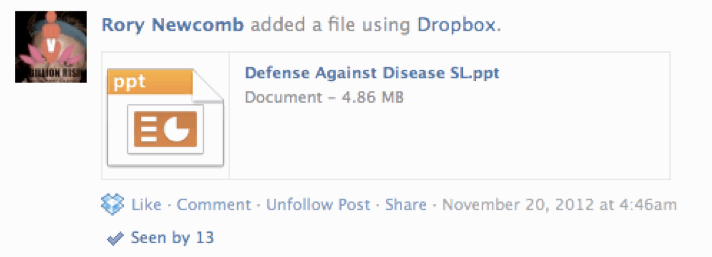This Web-based App is Nothing Short of GENIUS
This morning as I read through my Facebook news feed, I came across an annotated article from the WaPo that my friend, Melanie Smith-Bell had shared. As a lead into to the article, Melanie said:
“I love it when the Washington Post does their interactive features with the annotations where you get a brief explanation for each highlight and then further links to help you find more information on the specifics. That’s what online journalism needs to move toward. Using the full capability of web based information.”
After reading the article, I happened to agree with her assessment of her reading experience. This got me thinking... For years now, I have kept a running Facebook group for my biology classes where I post articles that are relevant to the topics we are discussing in class, and I encourage students to do the same. This allows us to extend conversations about biology beyond the textbook, the walls of my classroom, and the 90 minute time limit. The articles I choose are meant to do two main things:
- Expose students to real world applications of the content that we study in a limited scope that is defined by the textbook and the curriculum. In courses with external exams like IB and AP, the syllabus drives the teaching, and time is always a limiting factor. Sometimes it is hard to model the application of foundational learning to the world that we live in to the extent that we would like.
- Help kids to revise content throughout the course by pointing out connections to prior learning in applications that are integrated, not just topic specific.
Sharing articles is a great first step, but there have always been limitations to truly accomplishing what I set out to do by simply sharing the article.
- Often the articles I post contain foundational information that goes to a greater depth than the content presented in class. I have always wished that I could walk the students through these articles and offer enough of an explanation for the concepts that they are unfamiliar with to allow them to truly access the significance of article itself. Simply adding a commentary at the end doesn't do the trick because it doesn't reveal my triggers.
- As I engage in reading these articles, I actively think of applications, questions, further potential for scientific exploration... the list goes on. I have always wished that I could share these thoughts, extensions, and questions with the students to model active reading, engagement, critical thinking, exploration, and questioning.
- Nothing that happens in the real world is isolated. Everything is integrated. Yet, when we teach a science curriculum it is often isolated. Today we are talking about the chemical structures of starches. Tomorrow we are going to talk about enzyme digestion of starch. While there is an opportunity to make connections during these spiraled learning experiences, again, time is limited to truly dig in and reteach. Not to mention, students do not innately transfer learning. Making connections and transferring new learning to other concepts, disciplines, and real world problems are things that need to be modeled and taught.
- Just because I share an article, it doesn't mean that every student reads it. How do we ensure that they have not only read an article, but understood it, and have the space to ask questions and explore along their own pathway of learning?
As I read the WaPo article, I found the annotations to be extremely helpful. There were so many gaps in my knowledge that I would have missed most of the subtle nuances. What ARE the rules guiding a FISA warrant? How is it renewed? If I am not armed with this knowledge, I run the risk of accepting the claims in the memo simply because it was written by someone who by the nature of their job and qualifications are in a better position to judge this issue accurately. Thanks to the annotation, I was enlightened about things that helped me to read this memo with a more critical eye and I was empowered to formulate my own questions.
The top of the annotation sidebar had the logo GENIUS, so I decided to search Genius annotations. It turns out that Genius is a free web-based annotation software originally intended for annotation of music.
So why was WaPo using this app to annotate its articles? Hmmmm.... This is the beauty of innovation. According to Yale Information Technology Services:
“Innovation can be defined as the process of implementing new ideas to create value for an organization. This may mean creating a new service, system, or process, or enhancing existing ones.”
Genius expanded its reach allowing news organizations like WaPo to take a site intended for the annotation of music and use Genius's re-purposed applications to create value for WaPo's readers. We as teachers have the power to do the same for our students. Not only can I now achieve the goals that I set out to accomplish with the sharing of articles on my Facebook groups, I can now pass on this power to my students as generators of their own commentaries and discussions about articles they read beyond science.
It could not have been easier to sign up. Simply go to this link and log on. Simple instructions on how to annotate articles can be found at this link. Here is an example of a short article that I messed around with for my class. Feel free to play with the comment function. After posting about this discovery, I have already heard back from many teachers with ideas of how this can be adapted to suit their unique educational needs in the classroom. To name a few:
- EAL teachers: Classroom teachers often share articles with language above the reading comprehension levels of many EAL students. EAL teachers can simply take the article, and highlight difficult words and annotate them with their meaning at a level that these students can understand allowing them to access the curriculum alongside the other students in the classroom.
- History teachers: When doing analysis of primary sources, history teachers could have students annotate articles as an assessment.
- English teachers: When analyzing the meaning of texts in literature, teachers can prompt discussion in the class around certain quotes to debate intentions, meaning, as well as pointing subtle nuances and writing strategies used by the authors (can you tell I am not an English teacher... or a history teacher ... or an EAL teacher for that matter??)
How might you use this in the courses that you teach?
After signing up, Genius sent me a welcome email. It seems they have developed a Genius News Blog that focuses on print rather than music. Perhaps an Education Blog is in their future? Check it out and let me know what you think. As Genius says:
“YOU CAN NOW ANNOTATE THE ENTIRE INTERNET! Welcome to the future! ”

















